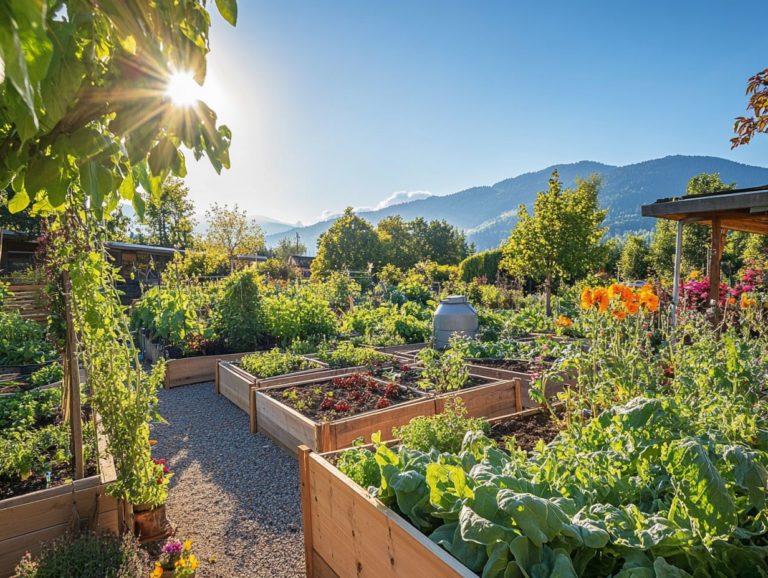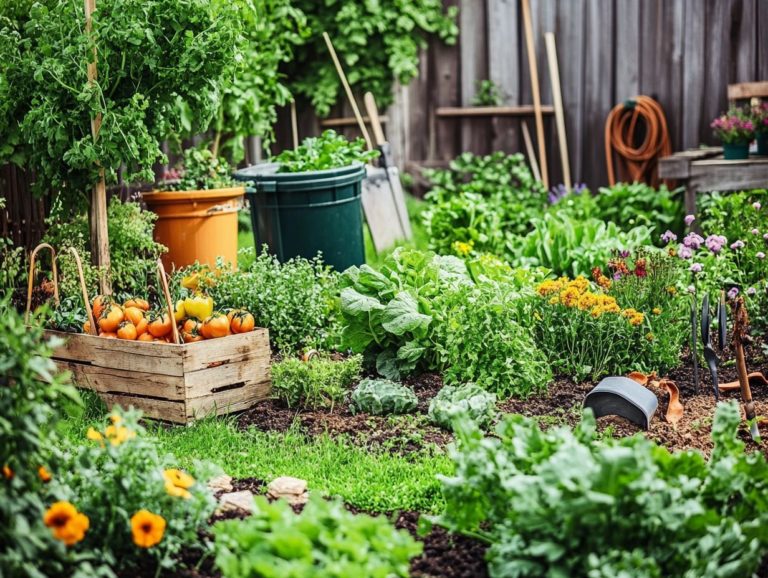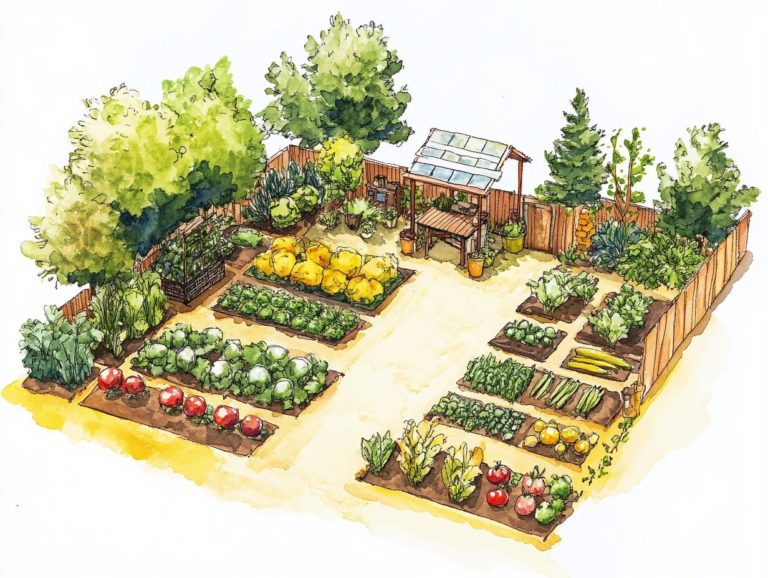What Are the Top Local Events for Permaculture Enthusiasts?
In recent years, permaculture has become an essential approach to sustainable living, seamlessly integrating agriculture with ecological principles to foster resilient communities.
This article delves into an array of permaculture resources and organizations, spotlighting prominent centers such as the South Florida Permaculture Resource Center and Urban Farm U.
Explore what permaculture entails, its fundamental principles, and the positive influence it can have on local communities. Get ready to dive into exciting events and opportunities that will connect you with this transformative movement!
Contents
- Key Takeaways:
- South Florida Permaculture Resource Center
- Urban Farm U
- Permaculture Skills Center
- Permaculture Gardens
- Wild Abundance
- Grow Permaculture, LLC
- Verge Permaculture
- Ancient Origins Permaculture
- What Is Permaculture and Why Is It Important?
- Frequently Asked Questions
- What is permaculture and why is it important for local events?
- How can I get involved in permaculture events in my local area?
- What types of events can I expect to find at a permaculture resource center?
- What are some popular permaculture events in South Florida?
- Are there any permaculture events specifically for beginners?
- How can I find out about upcoming permaculture events in my local area?
Key Takeaways:
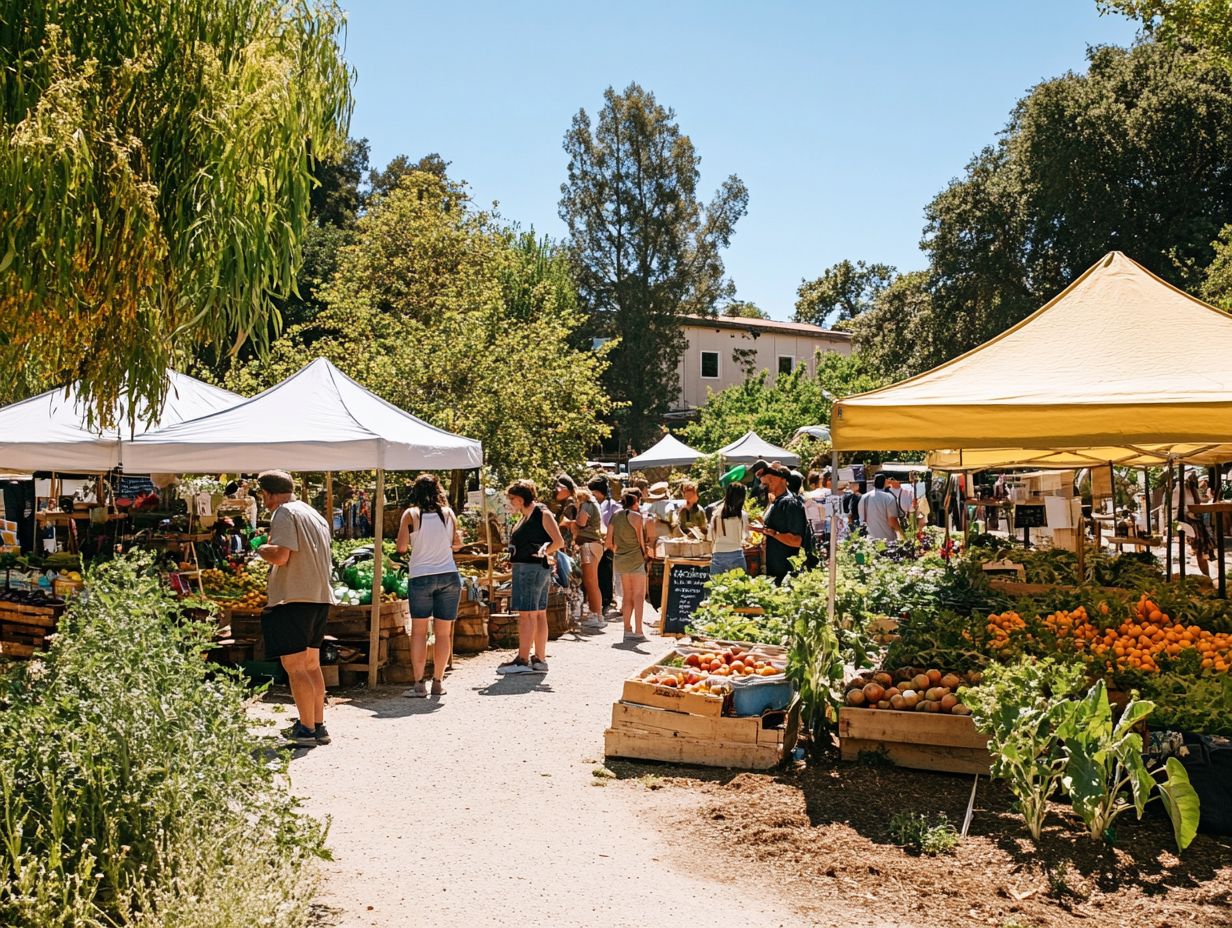
- South Florida Permaculture Resource Center offers a wealth of resources and education for permaculture enthusiasts in the West Palm Beach area.
- Permaculture Skills Center in Sebastopol, CA, provides hands-on training and education for those looking to incorporate permaculture principles into their daily lives.
- From workshops to hands-on projects, Wild Abundance in North Carolina offers a variety of local events for permaculture enthusiasts to get involved with and learn from.
South Florida Permaculture Resource Center
The South Florida Permaculture Resource Center serves as an essential hub for anyone interested in sustainable practices. Here, you ll find courses and resources designed to empower you in the principles of permaculture and Earth Repair.
Through platforms like Facebook and Messenger, registering for events and accessing valuable information becomes seamless. You can easily connect with fellow enthusiasts of land restoration, tapping into a vibrant network of collaborative groups throughout the region.
Beyond foundational courses, the center also offers specialized training in restoration of damaged land, allowing you to master techniques to restore degraded ecosystems and enhance soil health. Regular community events think workshops and engaging group discussions invite you to actively participate in sustainability initiatives.
Collaboration is at the heart of what they do, helping to link individuals and organizations through invaluable networking opportunities. Their social media presence on platforms like Instagram keeps you updated on upcoming events and provides insights into effective permaculture practices, making it effortless for you to join the movement toward a more sustainable future.
Urban Farm U
Urban Farm U is dedicated to equipping you with practical permaculture skills tailored for urban living, offering vital knowledge for achieving sustainability and food production right in the heart of the city.
Beyond a comprehensive curriculum, the institution places a strong emphasis on hands-on learning experiences that truly resonate with the community. You ll have the chance to dive into urban farming projects, applying your newly acquired skills in real-world settings.
The courses are thoughtfully designed to weave permaculture principles into urban landscapes, helping you understand how these practices can enrich local ecosystems. Through partnerships with nearby marketplaces, you’ll learn to connect your sustainable produce with local consumers, fostering personal growth and a sense of communal well-being.
Permaculture Skills Center
The Permaculture Skills Center is committed to empowering you with the essential skills and knowledge needed to implement sustainable practices within your community. Through immersive workshops and hands-on training, you ll gain a wealth of experience.
With a diverse array of workshops at your fingertips, you can delve into topics like agroforestry, food forest design, and organic gardening. These sessions offer not just theoretical insights but also practical, actionable techniques that you can readily apply in your own local environment.
By mastering skills such as soil health management, permaculture design principles, and ecosystem restoration, you will be well-equipped to foster biodiversity and enhance food security in your neighborhood. This hands-on approach deepens your understanding of sustainable ecosystems and empowers you to create meaningful, lasting change in your community.
Permaculture Gardens
Permaculture gardens serve as a prime example of sustainable design principles, crafting productive ecosystems that not only provide food but also enhance biodiversity and foster community engagement.
These gardens incorporate various design approaches that align with nature. This includes the thoughtful use of native plants that thrive in local climates and soil conditions.
By applying companion planting techniques, you can cultivate beneficial relationships among different species, leading to natural pest control and improved nutrient absorption.
The success of these initiatives hinges on community involvement, as individuals unite to share knowledge, labor, and resources. Many local communities have experienced remarkable transformations through these efforts, showcasing vibrant permaculture projects that not only nourish their members but also promote environmental stewardship and social cohesion.
Wild Abundance
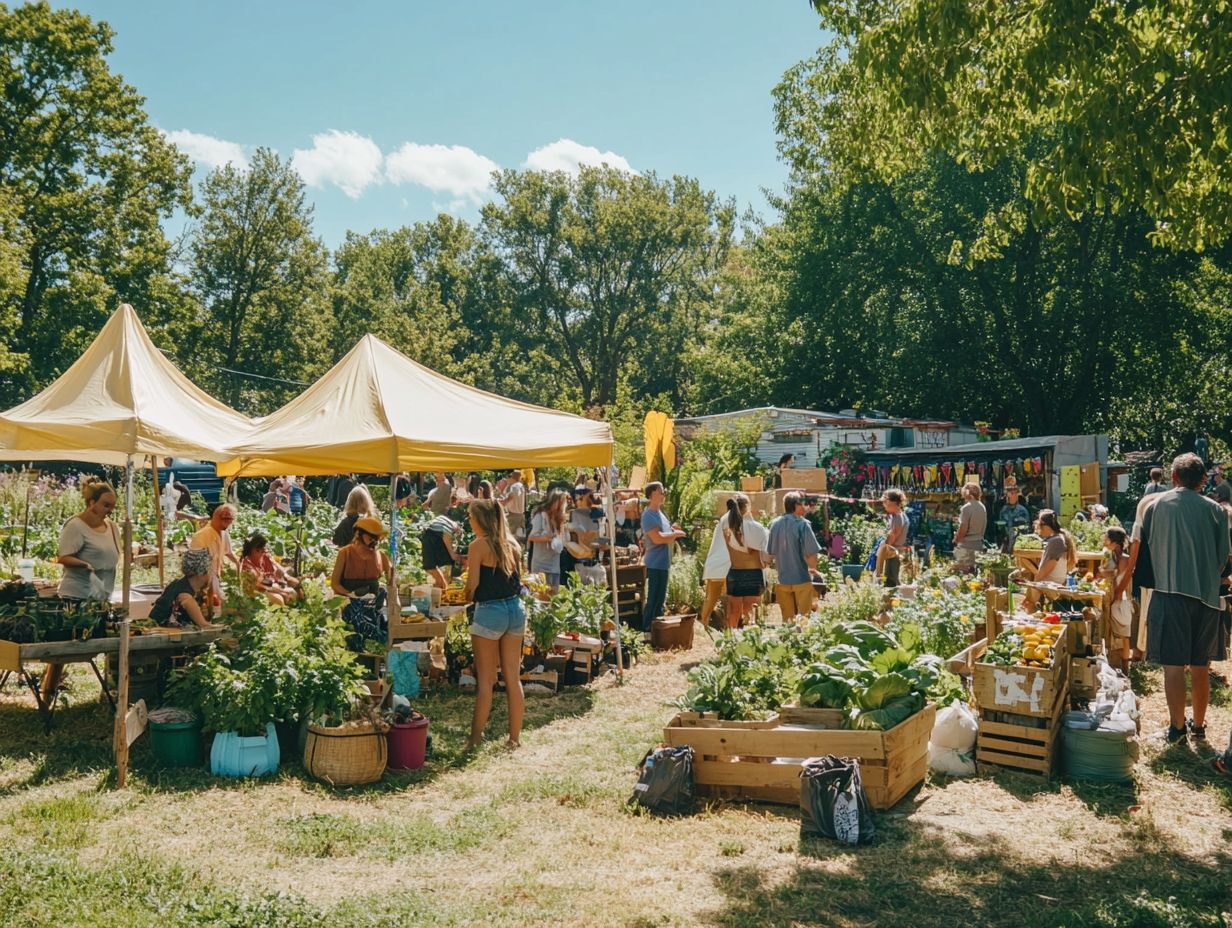
Wild Abundance presents a unique opportunity for you to engage in transformative learning experiences centered around herbalism and bioremediation (the process of using living organisms to clean up contaminated environments), empowering you to forge a deeper connection with nature and adopt sustainable practices.
In immersive workshops, you will explore the countless uses of local plants, equipping yourself with the skills to identify, harvest, and harness their healing properties for your everyday life. The hands-on sessions will dive into the principles of bioremediation, inviting you to collaborate with fellow community members in rejuvenating contaminated landscapes and restoring ecological balance.
By engaging with nature in this innovative manner, you not only enrich your own life but also actively contribute to collective environmental restoration efforts. By nurturing these relationships, you can transform your community into a hub of sustainability!
Grow Permaculture, LLC
Grow Permaculture, LLC specializes in providing you with learning materials and design help that foster sustainable practices within your community and landscapes.
By prioritizing hands-on learning and local engagement, they ensure that their initiatives resonate with the unique challenges and opportunities specific to your area. Their offerings encompass a variety of workshops, meticulously crafted to equip you with practical skills in permaculture design and systems.
Whether it’s about growing food efficiently or managing water resources sustainably, these workshops are designed to do more than just impart knowledge; they encourage local collaboration. This way, you can work with your community to create tailored solutions that promote ecological balance and resilience.
Through this adaptive approach, Grow Permaculture empowers you and your community to thrive on your land while nurturing the environment.
Verge Permaculture
Verge Permaculture offers a diverse array of online courses designed to deepen your understanding of permaculture, empowering you to engage in sustainable practices, no matter your background.
These courses are expertly crafted to cater to learners from all corners of the globe, ensuring that accessibility is never an issue. By leveraging technology, the platform facilitates real-time interactions among students, creating a dynamic community. You ll find ample support through interactive forums where you can share insights, discuss challenges, and collaborate on projects.
This sense of community goes beyond mere discussions; participants often join forces for collaborative assignments, embracing a hands-on approach to learning that reflects real-world permaculture applications. Through these initiatives, you ll not only expand your knowledge of sustainability but also forge lasting connections with like-minded individuals who share your passion.
Ancient Origins Permaculture
Ancient Origins Permaculture invites you to delve into traditional agricultural methods and their modern applications. This approach seamlessly blends ancestral wisdom with contemporary practices for sustainable living.
By examining time-honored techniques like the ancient Mesopotamian irrigation systems or the shifting cultivation methods of Indigenous peoples, you can adapt proven strategies to tackle today s environmental challenges.
The incorporation of traditional companion planting not only nurtures biodiversity but also enhances soil health. This aligns perfectly with current permaculture principles.
Embracing these historical insights will equip you to tackle pests and climate variability. This creates a harmonious balance between the wisdom of the past and the sustainability of the future.
What Is Permaculture and Why Is It Important?
Permaculture is a complete approach to land management and agriculture that weaves together sustainability, ecological balance, and community resilience. In a world facing environmental challenges, embracing permaculture becomes essential.
This innovative methodology highlights the intricate connections between all living systems. It strives to create ecosystems that support themselves, serving both humanity and the environment.
By applying strategies like companion planting, water conservation, and soil regeneration, you can enhance productivity while significantly reducing waste.
In the realm of sustainable development, permaculture plays a pivotal role. It enables communities to adapt to climate change by improving food security and revitalizing degraded lands.
By imparting these principles, you empower communities to build resilience. This fosters a profound understanding of local ecosystems and encourages ethical stewardship of the earth’s precious resources.
What Are the Basic Principles of Permaculture?
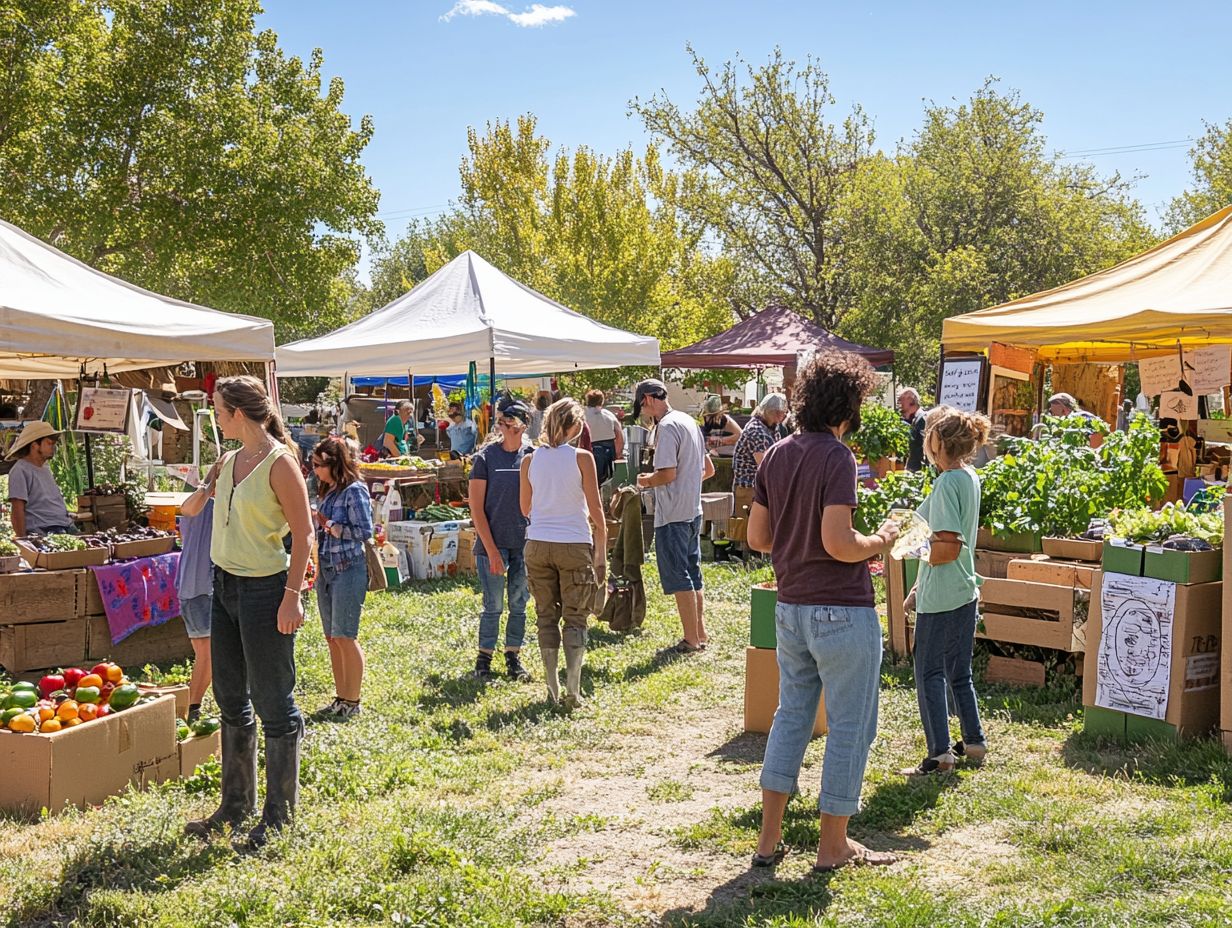
The basic principles of permaculture guide you toward ecological design strategies. These prioritize sustainable land use, resource conservation, and community engagement, ensuring the long-term health and viability of ecosystems.
You can see these strategies in action through various real-world projects. For example, community gardens encourage interaction with the local environment.
By observing the patterns of sunlight and water flow, you and your neighbors can craft gardens that yield abundant crops while preserving native flora and fauna.
The principle of obtaining a yield is brilliantly illustrated by urban farms. These farms provide fresh produce to neighborhoods lacking grocery stores.
Urban farms make the most of renewable resources like rainwater harvesting and composting to enrich the soil. Such initiatives cultivate ecological balance and enhance community resilience.
This fosters collaboration and knowledge sharing among residents.
How Can Permaculture Benefit Local Communities?
Permaculture presents a wealth of advantages for local communities, including enhanced food security, increased biodiversity, and fortified social ties through collaborative practices.
These practices spark a transition towards sustainable living, cultivating a sense of community ownership over local resources.
For example, a small town in Oregon has a community garden project that not only provides fresh produce but also serves as a central hub for educational workshops on resource management and composting. This drastically reduces waste.
Another inspiring instance can be found in Cuba. Urban agriculture transformed vacant lots into vibrant ecosystems, demonstrating that resilience can thrive even in urban environments.
By embracing such methods, communities nurture their surroundings. They also foster a robust network of support and interdependence among their members.
What Are Some Common Local Events for Permaculture Enthusiasts?
Local events for permaculture enthusiasts offer a variety of opportunities, ranging from hands-on workshops and community gardens to bustling farmers’ markets. These gatherings serve as vital platforms for learning, sharing, and engaging in sustainable practices.
At these events, you will gain insights into environmentally friendly methods and connect with a vibrant network of like-minded individuals dedicated to environmental stewardship. Seed swaps invite you to exchange local plant varieties. Meanwhile, seasonal festivals celebrate the harvest’s bounty, often showcasing local artisans and live music that enliven the atmosphere.
Your town may even host monthly clean-up days or tree-planting initiatives, promoting collective action and community involvement. Don’t miss out mark your calendars now for the upcoming Permaculture Convergence in July and the annual Eco-Fair in September. Both present fantastic opportunities for networking and fostering a spirited community, ensuring that sustainability remains at the forefront of local initiatives.
How Can One Get Involved in Local Permaculture Events?
Engaging with local permaculture events can be easily accomplished through various channels, including social media platforms like Facebook and Instagram, where community announcements are made regularly.
To broaden your network and forge meaningful connections, consider joining local gardening clubs or community forums dedicated to sustainable living. Attending workshops and volunteering at community gardens will refine your skills and offer a unique opportunity to meet others who share your passion.
Stay alert for newsletters from local environmental organizations, as they frequently share valuable information about upcoming events and gatherings. Participating in discussions and sharing experiences within community groups will deepen your understanding of permaculture while helping you cultivate lasting relationships with fellow enthusiasts who are equally invested in this rewarding journey.
What Are Some Resources for Learning More About Permaculture?
A wealth of resources awaits you in the world of permaculture, from online courses to insightful books and engaging community workshops that cover everything from design to implementation.
You can also explore educational opportunities on platforms like Coursera and Udemy, where structured online courses are offered by experienced practitioners, providing you with invaluable insights and knowledge. Websites such as the Permaculture Institute and the Permaculture Research Institute are treasure troves of articles and guides that will deepen your understanding.
If reading is more your style, consider diving into highly recommended titles like:
- “Permaculture: A Designer’s Manual” by Bill Mollison
- “Gaia’s Garden” by Toby Hemenway
To truly enrich your learning experience, attend community workshops often hosted by gardening clubs or agricultural associations. These gatherings not only provide hands-on experiences but also present the perfect opportunity to connect with others who share your passion for sustainable living.
Frequently Asked Questions
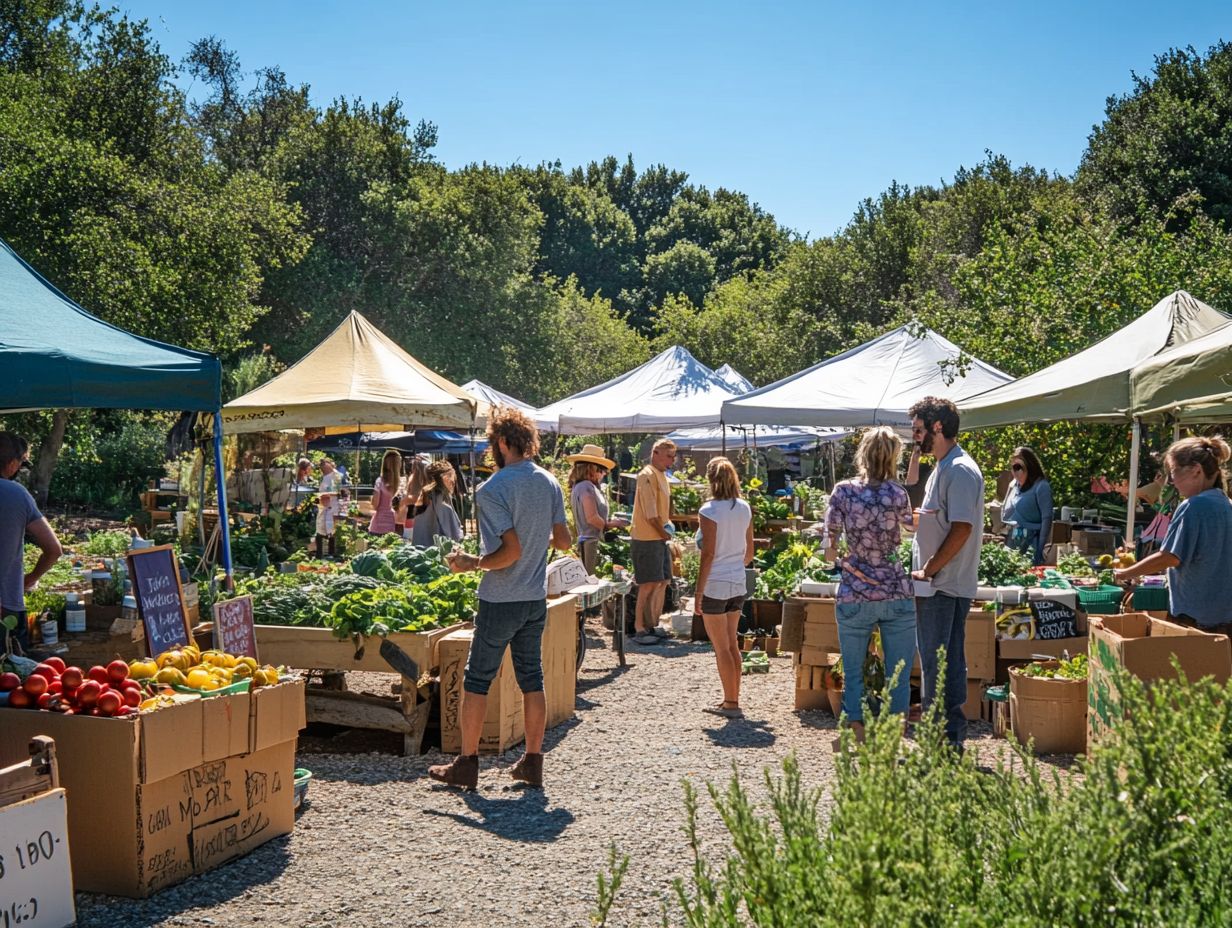
What is permaculture and why is it important for local events?
Permaculture is a holistic approach to sustainable living and land use that incorporates principles from ecology, biology, and sustainable agriculture. It is important for local events because it promotes community engagement and education about sustainable living practices.
How can I get involved in permaculture events in my local area?
There are many ways to get involved in permaculture events in your local area:
You can join a local permaculture group, attend workshops and classes, volunteer at community gardens, or even start your own permaculture project.
What types of events can I expect to find at a permaculture resource center?
Permaculture resource centers often offer a variety of events such as workshops, classes, and hands-on activities related to permaculture principles and practices.
Some may also have community gardens or demonstration sites to showcase permaculture techniques.
What are some popular permaculture events in South Florida?
Popular permaculture events in South Florida include hands-on workshops at the South Florida Permaculture Resource Center and classes at Urban Farm U. Join Grow Permaculture, LLC for exciting activities that make learning enjoyable!
Are there any permaculture events specifically for beginners?
Absolutely! Many events are perfect for beginners. These introductory workshops are designed to help you grasp the essential concepts of permaculture easily.
How can I find out about upcoming permaculture events in my local area?
Want to stay updated on local permaculture events? Join local groups, follow permaculture organizations on social media, and check community calendars or websites for the latest listings!
Don t miss out on the opportunity to dive into the world of permaculture explore, learn, and grow with us!

